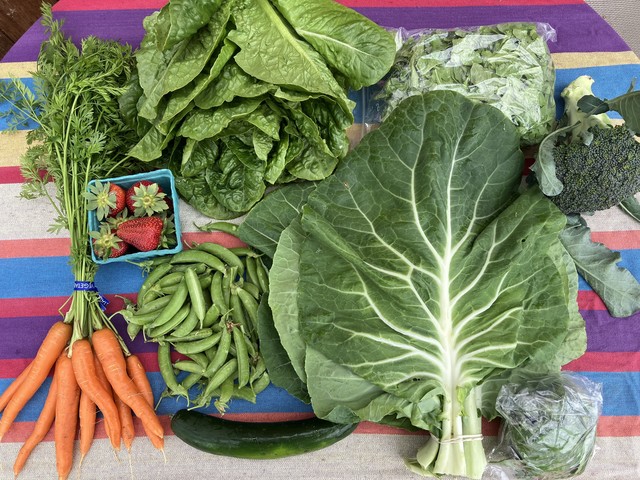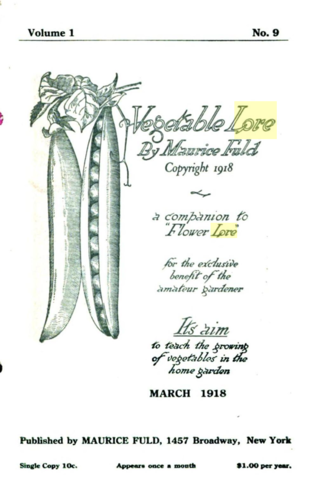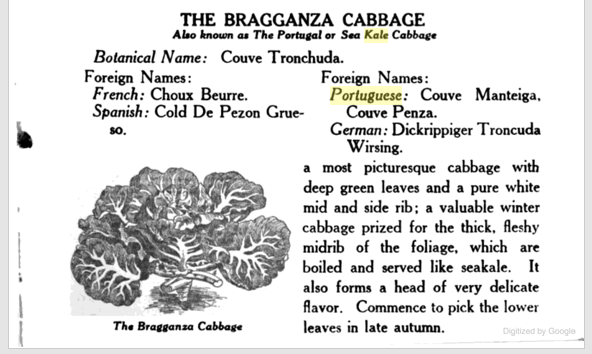- Arugula
- Broccoli
- Carrots
- Portuguese Kale
- Lettuce
- Sugar Snap Peas
- Strawberries
On Rotation:
- Cilantro
- Basil
- Cucumbers
- Zucchini
Those Aren't Collards! It's Portuguese Kale!
The GIANT elephant-ear sized bunch of greens in your share this week is a new-to-us kale variety. It goes by many names: Portuguese kale, Tronchuda Beira, Bragganza Cabbage, or sea kale. I've been curious about this unusual variety for awhile and thought it might be a good late-summer substitute for collard greens, which always fizzle out for us after their initial flush. It's the basis of the unofficial national dish of Portugal, Caldo Verde, a simple soup that is served all over the country. It can also be prepared any way you would use kale or collards, plus the thick white stem can be peeled and eaten raw - similar to broccoli stalks. This variety has been around for a long time but isn't something you'd ever find in a grocery store nowadays.
The growth on these huge plants has been incredible this spring, outpacing any of our other kale varieties in the field. As they've matured they've started to resemble loose heads of cabbage, which - according to our friend Maurice Fuld of 1918 gardening fame (above) - is another way you can harvest them (log the whole plant instead of bunching leaves). But contrary to what Maurice says, ours are not going to be a valuable winter crop because we noticed yesterday that they are already starting to bolt. It's possible that the long days of solstice have triggered the plants, which would argue for sowing it with our late season kales instead (planted in mid-July for fall/winter production instead of late March for spring/summer production). The problem with that is that the seed catalogues don't describe it as very winter hardy, so alas, this might be a once-and-never-again variety that graces the fields of Valley Flora. We opt for kale varieties that will produce for a full season - and into the winter - in order to maximize the production we get from a single bed. Suffice to say, you should make the most of this one-night-stand with handsome Tronchuda and whip up some Caldo Verde this week.
Even if Portuguese Kale ends up in the "failed" column, experiments and variety trials like this are the spice of life on the farm. We're ever-curious about vegetable varieties and are passionte about trying new things. Many of these experiments end like this one, but every now and then we stumble upon a new variety that becomes a beloved mainstay of our crop plan. "Glow" peppers, "Traviata" eggplant, ALL of the lettuce varieties we grow, our sweet corn, every individual component in Abby's Greens, Bets's tomatoes, our winter squash line-up, our potato varieties, all the different onions we grow - each and every one of these crops is being grown on the farm because it was a winner in one of our on-farm trials over the past 14 years. We are selecting for many different important attributes: we want varieties that grow vigorously and are relatively trouble-free (resistant to pests and diseases) in our temperate marine climate; that have excellent flavor; that are beautiful; that yield well; that ripen in time in our cooler growing season; that are efficient to harvest; that add diversity to our existing produce line-up; and in the case of potatoes, winter squash and onions, that store well into winter.
The energy that we have put into trials on the farm means that we have fine-tuned our crop plan to be highly specific to our location on earth: our microclimate, our soil, our growing season. That's an invaluable thing when you're trying to make the most of all the effort that goes into farming.
Enjoy this once-ever flirtation with Portuguese kale this week, and savor those "Mokum" carrots and "Seascape" strawberries, which we promise to keep growing until we're dead. :)



